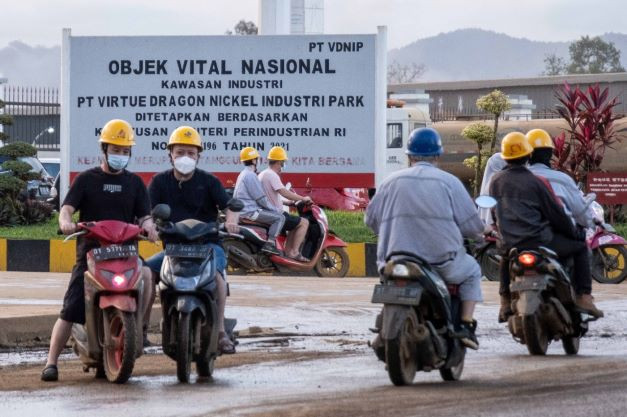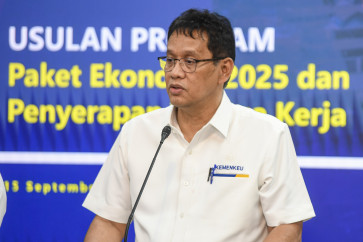Popular Reads
Top Results
Can't find what you're looking for?
View all search resultsPopular Reads
Top Results
Can't find what you're looking for?
View all search resultsIndonesian nickel today is what spices were to the VOC
Colonized people all around the world were lured and tricked to sign treaties so that, if problems arose, the colonizer could say: “I have to punish you, because you are not abiding by the rules that we have set.”
Change text size
Gift Premium Articles
to Anyone
T
hree years ago, I fiercely opposed Dutch King Willem-Alexander’s state visit to Indonesia. In an opinion article for this newspaper, I argued that the Western colonial empire never really collapsed, and that old-style colonialism only transformed into a new style of neocolonialism.
As an example of the ongoing greediness of the West, I referred to Europe’s opposition of the export ban on raw nickel that had just been implemented, a case that has yet to be settled.
Often, colonialism is linked to violence. But focusing on violence alone is misleading as it neglects understanding the causes of said violence. European colonists didn’t just commit atrocities out of the blue, they were aiming for something. The source of all that violence was the search for natural resources.
The Europeans wanted a monopoly over these resources with no exchange or equal profit. Nobody would voluntarily agree to these one-sided and unattractive “deals”. Therefore, European colonists had to use force to get what they wanted.
In order to justify and normalize this robbery, which was presented as “trade”, laws and regulations were created. Colonized people all around the world were lured and tricked into signing treaties so that, if problems arose, the colonizer could say: “I have to punish you, because you are not abiding by the rules that we have set.”
Before violence occurred, the colonizers’ interest in resources led them to attempt to get these resources for extremely low prices through deals with locals, written on paper. After they met resistance, atrocities were committed. Violence has always been a byproduct, never the goal. The basis of colonialism lies in the willingness to use any means necessary to fulfill selfish greed.
This greed has never stopped. Nickel today is what spices were to the Dutch East India Company (VOC). Indonesia became independent in 1945, and except for West Papua, Dutch soldiers left the archipelago in 1949.
Although this may have seemed promising, it wasn’t the fall of the empire. From the 1950s onward “old style” Western colonialism (direct occupation) turned into “new style” colonialism (indirect rule). This took the form of United States imperialism and military intervention, which is often supported by Western European countries such as the Netherlands.
Last year, when the World Trade Organization (WTO) decided in favor of the European Union (EU) in the nickel case, President Joko “Jokowi” Widodo appropriately remarked, “In the VOC era there was forced labor and forced cultivation, today there is forced export”.
The nickel dispute between the EU and Indonesia recently entered a new phase. A trade war is looming. Last July the EU launched a consultation among stakeholders, mainly European businesses affected by the ban, on whether they should take countermeasures against Indonesia. The consultation will end next month.
As part of the EU, the Netherlands is still invested in Indonesia’s economy, so I sent an e-mail to the Dutch Foreign Affairs Ministry. I wanted to know their position on this matter, which remained unclear. On the ministry’s website and in Dutch media there is almost no coverage of the nickel dispute. In the very exceptional cases in which Dutch journalists have paid attention to the issue, Indonesia was portrayed as a polluting, profit-driven and power-hungry country. Ironically, this image reflects that of the colonizer.
It was not that Dutch-Indonesian relations have not been discussed at all. On the contrary, the Dutch King’s state visit to Indonesia in March 2020 received a lot of media attention. Another important moment was the presentation of the results of the Dutch government-sponsored research on violence, in February 2022, and the subsequent apology of Prime Minister Mark Rutte.
In these cases, the impression was made that the relationship between our two countries is fine. The dominant message was that we, Dutch people, had changed, we were ready to move on. However, as the nickel case proves, nothing could be further from the truth.
Despite all the beautiful words, my fellow Dutch, and especially the government, are still as colonial as ever. This was reinforced last June when Rutte pretended to acknowledge 1945 as the year of Indonesia’s independence. It turned out to be a blatant lie, as the government later added that it was not a legal recognition, and that the Netherlands still holds on to 1949.
Meanwhile, everybody remains silent about the nickel issue. Was that because it would reveal that all these apologies were just empty words? The spokesperson of the Dutch Ministry of Foreign Affairs replied to my question by saying that the Netherlands was on the same page as the EU regarding the nickel case.
The reply basically read: Indonesia is not following the rules. But which rules? The unjust rules of the colonizer? Which included punishment and countermeasures for not serving the interests of the West?
Interestingly, other Asian countries do not seem to have a problem with the nickel ban.
For the Indonesian economy, the ban has had the desired effect. Last June, the International Monetary Fund (IMF) published a report on the Indonesian economy, stating that 11 nickel smelters have now been realized and that another 19 are planned. Foreign companies invested US$22 billion in Indonesia's economy that year, and nickel exports rose from $4.5 billion in 2019 to $19.6 billion in 2022.
More than 80 percent of Indonesia's refined nickel exports went to China. At the end of July, Jokowi returned from a two-day visit to China with billions of dollars in investment.
Many formerly colonized countries in Southeast Asia, Africa and South America no longer want to supply European and US industries with unprocessed raw materials without sufficient earnings for themselves.
The recent coup in Niger, for example, has been linked to the country's large reserves of uranium, which the French eagerly want to gain access to. In April, Chilean President Gabriel Boric announced the nationalization of his country’s lithium industry. Furthermore, many Asian countries, such as India, South Korea and Indonesia, are getting rid of the US dollar as their standard currency and are exchanging it for their own local currencies.
Although I believe that the colonial empire never fell, I do think that we might be seeing the beginning of the downfall. Old Europe is losing its grip. The WTO case shows the frustration of the EU about the new, multipolar world order that is emerging.
We have been at this point in history before. In the 1950s it was Sukarno who led the anti-imperialist, non-alignment movement that envisioned a multipolar world. For this act of resistance, which harmed the colonial interests, he was “punished” in 1965 with an attempted coup that resulted in his removal as president.
Perhaps this time, things are different. It seems that the West is no longer has the power to set the rules for the rest of the world.
***
The writer is a historian and founder of Histori Bersama.










